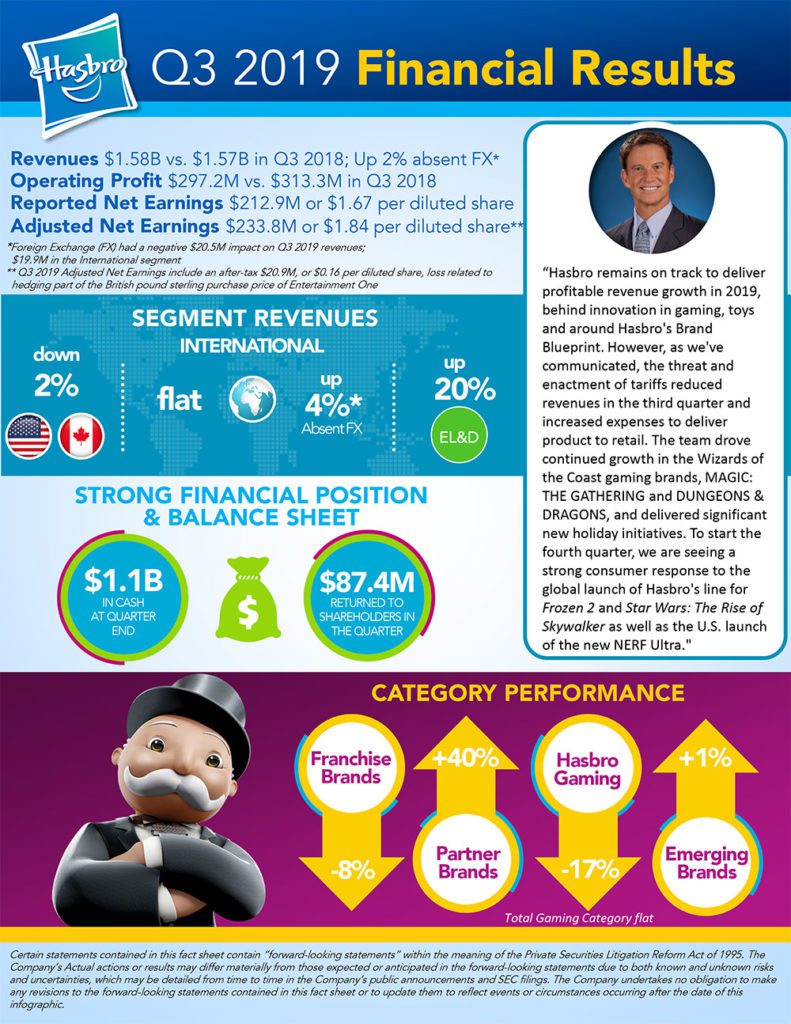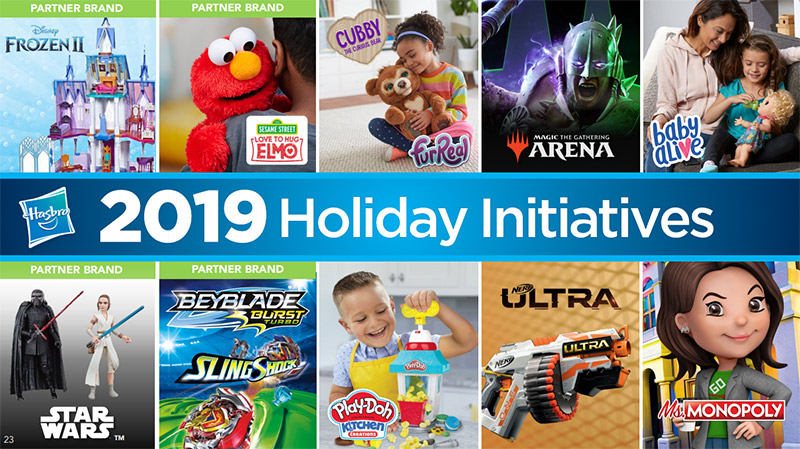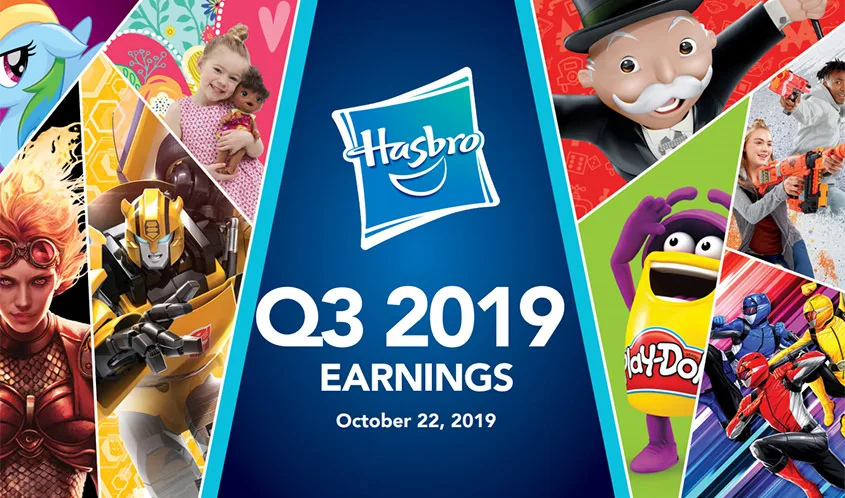In an unusual turn, Hasbro fell short of analyst expectations for the third quarter, marking what is perhaps the most public-facing toy industry impact thus far related to the looming threat of tariffs on toys. The potential for a tariff-related downturn was discussed during the previous quarter’s earnings call.
The Rhode Island-based toymaker’s performance amounts to $1.84 per diluted share, which came in below the analyst forecast of $2.21. Q3 revenue was $1.58 billion compared to $1.57 billion a year ago. Absent a negative $20.5 million impact of foreign exchange relating to the pending acquisition of Entertainment One (eOne), Q3 revenue rose 2%. Operating profit in the U.S. and Canada fell 13% to $193.7 million versus $223.1 million in the same period last year. Overall operating profit fell to $297.2 million versus $313 million last year.
“Hasbro remains on track to deliver profitable revenue growth in 2019, behind innovation in gaming, toys, and around Hasbro’s brand blueprint. However, as we’ve communicated, the threat and enactment of tariffs reduced revenues in the third quarter and increased expenses to deliver product to retail,” says Brian Goldner, Hasbro’s chairman and CEO. “The team drove continued growth in the Wizards of the Coast gaming brands, Magic: The Gathering, and Dungeons and Dragons, and delivered significant new holiday initiatives. To start the fourth quarter, we are seeing a strong consumer response to the global launch of Hasbro’s line for Disney’s Frozen 2 and Star Wars: The Rise of Skywalker as well as the U.S. launch of the new NERF Ultra.”
The company cited higher shipping and warehousing expenses that were a direct result of “the disruption and shift of retailer order patterns” in planning for the tariffs, which are currently slated to go into effect on Dec. 15. Based on internal components, some individual products are likely seeing increased costs already.

Franchise, Partner, Gaming, and Emerging Brands
Sales of Hasbro’s in-house franchise brands decreased 8% despite revenue gains across Transformers, Magic: The Gathering, and Monopoly. The company cites decreases in NERF, My Little Pony, Baby Alive and Play-Doh in the quarter. Partner brands continue to see growth, with a 40% increase driven by the sales of products related to Marvel’s Avengers, and Spider-Man franchises, Disney’s Descendants 3, and early shipments of products relating to the Oct. 4 launch for Star Wars and Frozen 2.
Hasbro Gaming saw a surprising 17% drop, with gains in new products for fall being offset by declines in aging products such as Pie Face and Speak Out. Notably, several of Hasbro’s biggest games are not tracked under the gaming category but are included under franchise brands. This includes Monopoly and Magic: The Gathering, among others. Power Rangers and Playskool are cited as highlights in the 1% growth for emerging brands.
Third Quarter 2019 Brand Portfolio Performance
|
|
Net Revenues ($ Millions) |
||
|
Q3 2019 |
Q3 2018 |
% Change |
|
|
Franchise Brands |
$779.7 |
$847.7 |
-8% |
|
Partner Brands |
$427.0 |
$305.8 |
40% |
|
Hasbro Gaming |
$232.3 |
$280.8 |
-17% |
|
Emerging Brands |
$136.2 |
$135.3 |
1% |
The Ever-Changing Tariff Situation
On a call with investors, Goldner went into further detail about how the tariff situation has created new challenges for Hasbro’s business — particularly due to changing dates and canceled orders. He says that U.S. sales declined slightly as retailers lowered inventory.
“As you recall, since the administration began discussing tariffs, we have outlined the ripple effect they would have on our business,” Goldner says. “We’ve spoken about the changing order patterns in the U.S., whether or not tariffs are ultimately enacted. In the third quarter, the threat of, and the implementation of tariffs in certain instances impacted our shipments, and our ability to fully meet demand. Importantly, during Q3 alone we saw multiple different dates for the enactment of list 4 tariffs come and be delayed, now scheduled for Dec. 15, and yet the prospect had our retailers cancel major direct import program orders and rewrite many of those orders as domestic shipments. The impact of the shift was that July and August total shipments were lower and September shipments were far higher than a year ago. However, given the location of our inventory in Asia to satisfy direct import orders during July and August, we ultimately were unable to re-plan the orders and rewrite all of the orders from direct import to domestic orders all within the quarter.”
The shifts caused Hasbro to miss shipment on some orders, many of which it says came late in September, bumping the sales into the fourth quarter. To meet demand for Triple Force Friday and Frozen Fan Fest, along with the debut of NERF Ultra, Hasbro added air freight and shifted warehousing which came at an incremental expense.
“We are working diligently to improve our approach to domestic shipments, and still face the prospect of more direct import cancellations and shifts to domestic orders as the Dec. 15 list 4 date approaches for most of our product lines,” says Goldner. “We’ve built a domestic supply chain that, like much of our approach to product manufacturing and distribution, is asset-light. We have historically used a balance of customers’ shipments and our own domestic shipments through third-party suppliers to manage our costs and make our supply chain most effective and cost-efficient. In this current environment, we’ve been transitioning and redesigning our U.S. supply chain at pace. In addition, while the Dec. 15 action will hit the majority of our products, List 4A tariffs enacted in September impacted some of our games during the third quarter. The direct import orders for these items were canceled and we worked to get supporting domestic orders while also adjusting pricing to cover the tariff’s impact and protect our gross margin.”
Goldner also notes that if the company takes no action, direct import shipments will all but stop.
“If we take no action the planned Dec. 15 tariffs will curtail direct import shipments by retailers as they want product arriving on or after the 15th to be imported by Hasbro and demand fulfilled in the U.S. The team is working on programs to help mitigate this impact as well as the impact on our consumers this holiday season, but we anticipate continued potential disruption in the fourth quarter,” he says.
While Hasbro continues to source 20% of its business from within the U.S., the company is moving ahead as planned to reduce sourcing of products for the U.S. market to 50% by the end of next year. The company is finding success in building a manufacturing base in countries such as Vietnam, India, and others.

Future Outlook
Looking ahead, Hasbro continues to focus on building its IP portfolio and looking at new ways to connect with families through “story-led” toys and entertainment. This includes live entertainment events and experiences, such as the recently-announced NERF Challenge tour. Despite the logistic challenges, the company has a strong holiday lineup that should translate into dollars at the cash register.

